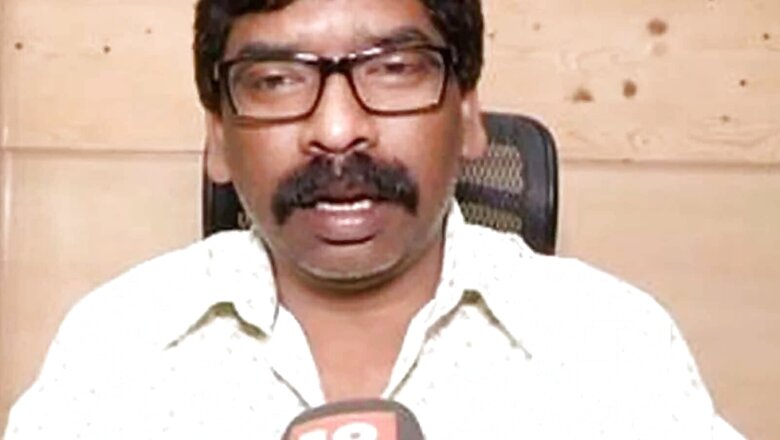
views
In politics, some decisions are made spontaneously and some are made deliberately. Jharkhand chief minister Hemant Soren has been in the eye of a storm because of some of his controversial decisions and utterances, leading to state-wide protests.
First, the allocation of a prayer room in the assembly for offering namaz opened up a Pandora’s box. The JMM-Congress-led coalition government stood rock solid behind assembly speaker Rabindra Nath Mahato’s decision but it provided the BJP a shot in the arm to target the Hemant Soren government. Terming the speaker’s decision “divisive and unfortunate”, the BJP cadres came out in full strength to mark their opposition.
Then, in an apparent bid to create a divide over speech, CM Hemant Soren targeted Bhojpuri and Magahi, terming them “imported languages” from Bihar.
Besides this, Soren specifically mentioned “all those who raped tribal women used to abuse in Bhojpuri language”, inviting harsh reactions from Bihar politicians.
Jharkhand was carved out of Bihar in the year 2000 and given separate statehood to protect the rights of the tribal people, who constitute about 26 per cent of the total population.
Bhojpuri and Magahi, undeniably, remain the most popular dialects of Jharkhand after Hindi.
Recently, the Soren government ordered the removal of Hindi, Bhojpuri and Magahi as regional languages from its employment policy, while the inclusion of Urdu as a regional language raised eyebrows over the chief minister’s intentions.
Hemant Soren is running a coalition government with the support of the Congress. So, the Congress’s silence is also being seen as tacit support on some of these controversial decisions.
After a debacle in the last assembly election, the BJP finds these issues as potent ammunition to attack the ruling combine and gain a foothold in the state’s politics. It has also helped all senior BJP leaders to bury their differences.
Political observers in Jharkhand believe that the assembly speaker would not have made the decision without calculating the political dividends.
Legally speaking, an order for a separate prayer room was issued from the speaker’s office and not from the chief minister’s office, as is the established practice. Yet Hemant Soren has to account for its political gains and losses.
Soren is the chief minister for a second term and he will not make a decision without weighing the pros and cons.
Questions are also being asked of the Congress party, which is avowedly secular, on how it is supporting the JMM on some of these divisive issues.
Even though no separate mosque has been built inside the legislative assembly, the question arises that how does one remove orders that discriminate against other religions?
Prima facie, this decision appears to be an act of “appeasement”. But how will CM Hemant Soren convince the Hindus, Adivasis and Christians that they will not be discriminated against in the future?
Most of the BJP leaders claimed that they were not against namaz, they were against the policy of appeasement.
In the legislative assembly with a combined strength of 81 members, it was asked why similar arrangements were not made for people of other religions?
Are they second-class citizens?
Doesn’t the Constitution give them the right to practice their religion?
After the introduction of the 42nd amendment, secularism was made part and parcel of the Indian constitution. The purpose of the amendment was to ensure that all religions are treated equally. It’s another matter that about 80 per cent of the residents of India follow Hinduism.
In the SR Bommai vs Union of India case, a nine-judge bench had held that secularism was part of the Indian constitution and it cannot be tampered with.
All religions are equal before the state, and they can’t discriminate against anyone. Everyone has the right to religious freedom, but will the state discriminate against any particular religion? Does the Constitution allow this?
The Jharkhand high court must address these questions when it takes up the case.
If the speaker of the legislative assembly wanted, he could have set a great example by opening a big hall for everyone to offer prayers together. No such controversy would have erupted.
At least this would have convinced all the people of Jharkhand that the government is being run by the Constitution and treats every citizen equally.
Read all the Latest News , Breaking News and Ukraine-Russia War Live Updates here.



















Comments
0 comment